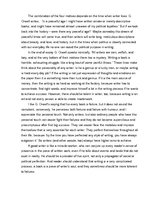

Some examples he gives include “exhibit a tendency to,” “serve the purpose of,” “play a leading part in,” “have the effect of.” (One particular peeve of mine when I taught English composition was the phrase “due to the fact that” for the far simpler “because.”)

Operators or verbal false limbs: these are the wordy, awkward constructions in place of a single, simple word. Orwell’s analysis identifies several culprits that obscure meaning and lead to whole paragraphs of bombastic, empty prose:ĭying metaphors: essentially clichés, which “have lost all evocative power and are merely used because they save people the trouble of inventing phrases for themselves.” Pay attention to how the next article, interview, or book you read uses language “favorable to political conformity” to soften terrible things. Ultimately, Orwell claims, bad writing results from corrupt thinking, and often attempts to make palatable corrupt acts: “Political speech and writing are largely the defense of the indefensible.” His examples of colonialism, forced deportations, and bombing campaigns find ready analogues in our own time.


 0 kommentar(er)
0 kommentar(er)
